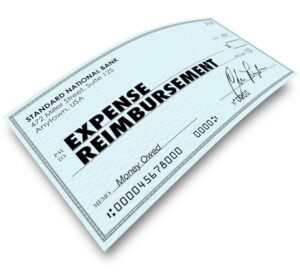Expat Advice on Unreimbursed Employee Expenses and Ways To Claim

Employee Business Expenses
As an employee, you may be able to deduct certain work-related expenses if you itemize deductions on Schedule A (which is worthwhile if your total itemized deductions are greater than your standard deduction based on your filing status). If you paid for out-of-pocket expenses related to your job during the tax year, many of these expenses may be eligible to be deducted on your return. However, in order to deduct unreimbursed employee business expenses, it must be ordinary and necessary expense for your job as an employee.
If your employer reimbursed you for the expense, it cannot be included as an unreimbursed employee expense deduction. Likewise, if it is an expense that normally would be reimbursed by your employer, but you did not request, it is not deductible.
Reimbursement Policy – Unreimbursed Employee Expenses
Make sure you know what your employer’s reimbursement policy is. If the policy is to reimburse the expense, be sure to claim it. If your employer does not reimburse you for your out-of-pocket work-related expenses, you can deduct them as an itemized deduction.
Expenses that qualify for an unreimbursed employee expense deduction can include:
- Business travel away from home
- Business meals and entertainment
- Business use of your car
- Travel
- Education
- Use of your home
- Tools
- Supplies
- Miscellaneous expenses
It is important that you keep records to prove the employee expenses you deduct. In addition, you should retain a copy of your employer’s reimbursement policy in the event of an audit.
Recordkeeping is particularly important for job-related expenses, whether you seek reimbursement from your employer or take a deduction on your personal tax return. The IRS expects business expenses to be substantiated with documentary proof of the expense deduction. Adequate substantiation means that for each expense, you have documents, such as receipts, to show the description, the amount, the business purpose and relationship, and the date and place where the expense was incurred.
Where To Report Unreimbursed Employee Expenses
Generally, you report unreimbursed employee expenses on IRS Form 2106 or IRS Form 2106-EZ and attach it to Form 1040. Deductible expenses are then carried forward to IRS Schedule A, as a miscellaneous itemized deduction.
Miscellaneous itemized deductions are deductible only to the extent that they exceed 2% of your adjusted gross income.
Our goal at Tax Samaritan is to provide the best counsel, advocacy and personal service for our clients. We are not only tax preparation and representation experts, but strive to become valued business partners. Tax Samaritan is committed to understanding our client’s unique needs; every tax situation is different and requires a personal approach in providing realistic and effective solutions.
If you would like a quote, please click on the button below for a free, no obligation Tax Preparation quote and/or free 30-minute consultation to discuss your situation regarding unreimbursed employee expenses further:
Tax Samaritan is a team of Enrolled Agents with over 25 years of experience focusing on US tax preparation and representation. We maintain this tax blog where all articles are written by Enrolled Agents. Our main objective is to educate US taxpayers on their tax responsibilities and the selection of a tax professional. Our articles are also designed to help taxpayers looking to self prepare, providing specific tips and pitfalls to avoid.
When looking for a tax professional, choose carefully. We recommend that you hire a credentialed tax professional such as Tax Samaritan that is an Enrolled Agent (America’s Tax Experts). If you are a US taxpayer overseas, we further recommend that you seek a professional who is experienced in expat tax preparation, like Tax Samaritan (most tax professionals have limited to no experience with the unique tax issues of expat taxpayers).
Randall Brody is an enrolled agent, licensed by the US Department of the Treasury to represent taxpayers before the IRS for audits, collections and appeals. To attain the enrolled agent designation, candidates must demonstrate expertise in taxation, fulfill continuing education credits and adhere to a stringent code of ethics.
Every effort has been taken to provide the most accurate and honest analysis of the tax information provided in this blog. Please use your discretion before making any decisions based on the information provided. This blog is not intended to be a substitute for seeking professional tax advice based on your individual needs.

All About Randall Brody
Randall is the Founder of Tax Samaritan, a boutique firm specializing in the preparation of taxes and the resolution of tax problems for Americans living abroad, as well as the other unique tax issues that apply to taxpayers. Here, they help taxpayers save money on their tax returns.